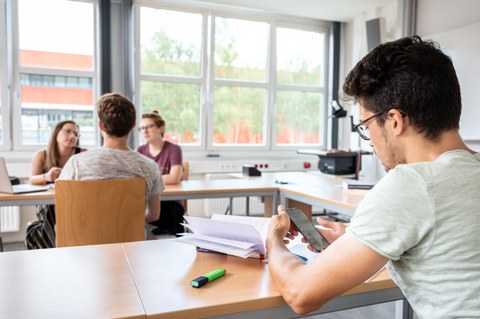Aug 20, 2024
New research tool: smartphone app analyses vaccination decisions in everyday life
An international research team has developed an innovative and unusual method for analysing vaccination decisions and their effects in real-life situations. The study, which was primarily conducted at the Technical University of Denmark (DTU) with the support of top-class scientists from international universities, including the Technical University of Dresden (TUD), shows how smartphones and a playful approach can be used to gain deeper insights into people's decision-making behaviour with regard to vaccinations.
The research team of scientists from different disciplines such as behavioural sciences, epidemiology and digital technologies, including Nicolò Alessandro Girardini (University of Trento), Arkadiusz Stopczynski (Technical University of Denmark), Olga Baranov (LMU Klinikum München), Cornelia Betsch (University of Erfurt), Dirk Brockmann (Technical University of Dresden), Sune Lehmann (Technical University of Denmark) and Robert Böhm (University of Vienna and University of Copenhagen), investigated which factors determine the dynamics of vaccination decisions.
A unique research approach: reality meets simulation
In the 12-week study, 494 DTU students were accompanied via a special smartphone app. This app used Bluetooth technology to record the real contacts between the participants and used this information to simulate the spread of a fictitious disease. The participants had to decide in several rounds whether they would be vaccinated, whereby they received different information about the health status of others.
Important findings: Personal experiences matter more
One of the key findings of the study was that participants based their vaccination decisions mainly on their own experiences, in particular on symptoms of illness they had experienced. Information about the health or behavior of other participants, on the other hand, played a lesser role.
"Our results show that in real-life decision-making situations, people react more strongly to their personal experiences or rely on personal assessments of risks than on what they hear or see about others," explains Prof Dirk Brockmann, co-author of the study. "This could have important implications for the design of vaccination campaigns, which often aim to convey information about community benefits."
Better understanding vaccination behaviour in real life
The researchers emphasise that this method not only enables a deeper understanding of individual vaccination behaviour, but also helps to better overcome the challenges of real-life vaccination campaigns. By simulating real-life encounters and the associated disease transmission, the app was able to capture the dynamics and complexity of vaccination decisions in a way that is not possible in classic laboratory studies or clinical trials.
"This research tool combines the advantages of controlled experiments with the real-life conditions under which vaccination decisions are made," says Prof Sune Lehmann, co-author of the study. "It offers a promising approach to test the effectiveness of interventions to increase vaccination uptake before they are implemented on a large scale."
Future prospects
The researchers hope that their method can be used in different contexts in the future to further deepen the understanding of vaccination decisions and the associated social dynamics. The results of the study underline the importance of personalised information and the need to take greater account of individual experiences in health communication.
About SynoSys
The Center Synergy of Systems (SynoSys), which was founded by Prof. Dirk Brockmann, Co-Author of the study, in October 2023 at the TUD Technical University of Dresden, develops transdisciplinary approaches and methods in the fields of network science, data science, digital science and citizen science with the aim of conducting integrative research into complex phenomena at the interfaces between biomedicine, social sciences and life sciences. The focus is on dynamic phenomena such as pandemics, chronic diseases, mental health, planetary health, and the emergence of cooperative systems in biology and society, which cannot be understood solely through individual, traditional sub-disciplines, but only through lateral perspectives and integrative methods from complexity research. SynoSys is not only a think tank – it’s also a “link tank” that teaches early career researchers about complexity research and science beyond disciplinary boundaries.
Original Publication
Dirk Brockmann et al., Using smartphones to study vaccination decisions in the wild. PLOS Digital Health, August 2024
Link: https://doi.org/10.1371/journal.pdig.0000550
Contact:
Prof. Dirk Brockmann, Director Center Synergy of Systems (SynoSys), Chair Biology of Complex Systems
Telefon: +49 351 463 40918

